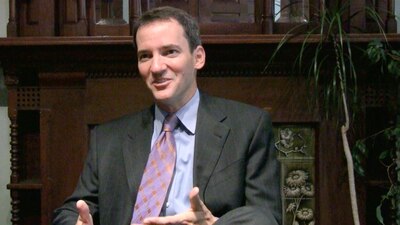
Andrew Romanoff proved he was not afraid to get dirty tackling tough education issues when, in a 2007 tour of rural schools, he poked his head into bat-guano filled attics to check out failing roofs and climbed atop rickety metal ladders to explore dubious fire escapes.
That experience eventually led to passage of Colorado’s first major investment in the capital, rather than operational, needs of schools statewide, a program known as BEST or Building Excellent Schools Today.
“It is the largest investment in school construction in state history,” said Romanoff, a Democrat who was then Speaker of the House, “probably because it’s virtually the only significant investment in school construction that we’ve made at a state level in the history of Colorado.”
Scroll to the bottom to see video clips of the EdNews interview with Romanoff.
In 2008, he got his hands dirty – figuratively – by diving into the state’s messy school funding problems, crafting a proposal to reconcile the demands of Amendment 23, the initiative that increases state education funding, with the constraints of the Taxpayers’ Bill of Rights or TABOR, the constitutional amendment that limits the revenues the state can keep.
Romanoff had already proven his mettle for compromise as a leader in the 2005 passage of Referendum C, building a bipartisan effort that persuaded Colorado voters to agree to a five-year “time out” from TABOR to prevent deep cuts in state programs.
The idea behind the 2008 plan, which became Amendment 59, was a permanent fix to the conflict between Amendment 23 and TABOR.
“The proposal that we authored said let’s invest the revenues that come into the state in excess of TABOR’s limits so when the economy is booming and revenue is rolling in, the money that would otherwise be rebated under TABOR would be instead sent to a rainy day fund, a savings account for education,” Romanoff said.
But placed on the longest state ballot since 1912 as the national economy was beginning to sour, the plan was rejected by voters.
“It’s really hard to make the case to finance a rainy day fund when it’s already raining,” Romanoff said.
So what does the U.S. Senate hopeful, who’ll face Michael Bennet in the August primary, have to say about the federal government’s role in education?
Plenty.
“The federal government as a warehouse of research or facilitator of best practices and information – that would be the perfect role for the federal government to serve,” he said. “I think if the feds are going to require states to do things, they should pay for it.”
He likes the voluntary National Assessment of Educational Progress or NAEP, called the nation’s report card, because it allows for comparisons across state lines. He supports the setting of national goals and standards – so long as they don’t “water down” any state’s own standards.
“I don’t support the elimination of the U.S. Department of Education, a proposal that one of the other candidates in this race made,” he said. “I think that’s crazy at a time when we’re engaged in an international economic competition.
“We need, I believe, a national commitment to improving student achievement and the benefits that can come from bringing some of the best practitioners in the country together and setting high national standards.”
As a lawmaker, Romanoff frequently cited three things as his educational priorities – early childhood education, recruiting and retaining quality teachers, and providing safe learning environments. He still calls early childhood education “the single best place that we can invest our hard-earned dollars.”
And as a community college teacher for the past 15 years, he has concerns about the push to link student achievement to decisions about teachers – though he declined to say how he would have voted on Colorado’s recently passed, and controversial, educator effectiveness bill.
“The single most important ingredient of a kid’s success is, of course, what goes on at home. But the second most important ingredient that contributes to student achievement is the quality of the teacher,” he said. “Since it’s harder for us to legislate good parenting, a lot of efforts in the capital and elsewhere are aimed at legislating good teaching …
“I’ve talked to a lot of teachers who feel demoralized because they’re expected to solve the problems that society has neglected.”
Click on the videos below to hear more from Romanoff. Click here to see the candidate’s education issues page.
Romanoff talks about a student who taught him about educational inequities across Colorado:
Romanoff talks about the federal government’s role in education:
Romanoff talks about the federal grant competition known as Race to the Top:
Romanoff talks about using student achievement to evaluate teachers, an emphasis of Race to the Top:
Romanoff talks about choice and charters, another emphasis of Race to the Top:
This is the first in an occasional video series in which candidates for the November ballot discuss their views on education. Reporter Nancy Mitchell can be reached at nmitchell@pebc.org or 303-478-4573.
